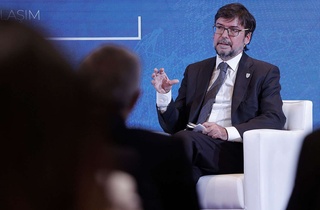Faculty Member Sergio Garcia Magarino of Navarra State University's Social Research Institute, Strategic Communications and Political Advisor İpek Tekdemir Rupp of the European Parliament, and Senior Analyst Jose Ventura Ballester of Spain's Foundation for Strategic and International Studies attended the panel moderated by Associate Professor İsmail Erkam Sula of Ankara Yıldırım Beyazıt University's Department of International Relations.
The panel started with a video message from the Presidency's Director of Communications, Fahrettin Altun.
Faculty Member Magarino of Navarra State University's Social Research Institute remarked that the Russia-Ukraine War revealed the extent of dependence on other nations for oil, food, and other necessities and said, “No country can fight against new challenges and global problems alone. It is imperative to act globally. We observed that, despite the existence of the UN, there was no intermediary structure. Because purely national interests continue to predominate, it is difficult for them to engage in intergovernmental politics. We need a collaborative system.”
Strategic Communications and Political Advisor Tekdemir of the European Parliament said, “The primary mission of the UN is to protect international security and peace, but it has not been able to produce a solution in recent history. We witnessed the failure of the UN to punish the oppressor, particularly during the Russia-Ukraine War. If the UN continues to be dysfunctional and ineffective, it will be unable to combat global threats such as climate change and nuclear weapons.”
Strategic and International Studies Analyst Ballester stated that the UN Security Council was now “becoming an advisory board or forum” as opposed to its original objective of producing a solution and said:
“No international organisation will thrive without understanding its environment. The UN is in a very different era from its founding in 1945. The concept of power is currently perceived differently, and the boundaries have changed. The UN is unable to respond to conflicts of interest and the protection of borders. There are too many questions and doubts about the structure of the UN, the veto system, and the decision-making mechanism. We can make the UN more democratic because we know that the world is bigger than five. We have to find more inclusive and common solutions.” (ILKHA)



 Dünya
Dünya
 Dünya
Dünya
 Dünya
Dünya
 Güncel
Güncel
 Güncel
Güncel
 Güncel
Güncel
 Güncel
Güncel
 Dünya
Dünya
 Dünya
Dünya
 Dünya
Dünya





